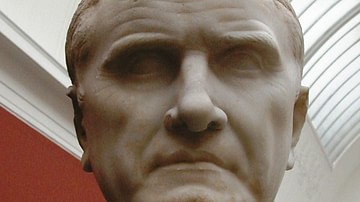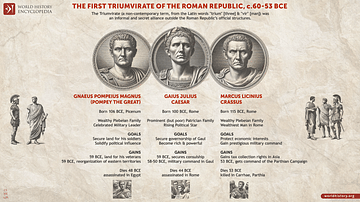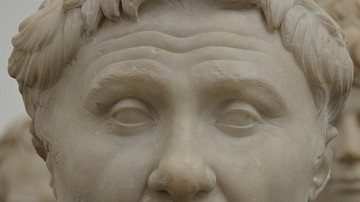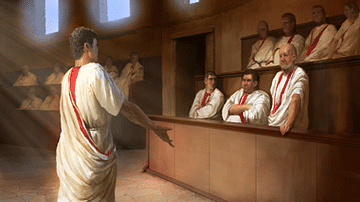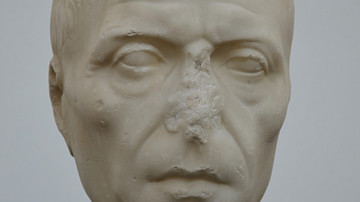The Roman Republic was in death's throes. Within a few short years, the “dictator for life” Julius Caesar would be assassinated, and, as a result, the government would descend into chaos. The consequence of a long civil war would bring the birth of an empire under the watchful eye of an emperor; however, it would also witness the loss of many personal liberties - liberties that were the pride of the people and the result of a long history of struggle and strife. Nevertheless, that was in the future - the year is 63 BCE and the city of Rome and the foundation of the Republic is being threatened. Luckily, one man would rise amidst the disorder, at least in his mind, to save it.
Rome's Economic Crisis
The year 63 BCE saw Rome as a city of almost one million residents, governing an empire that ranged from Hispania in the west to Syria in Middle East and from Gaul in the north to the deserts of Africa. Outside the eternal city, in the provinces, the next few decades would bring a strengthening of the borders - Pompey battling King Mithridates of Pontus in the East while Julius Caesar fought the assorted tribes of Gaul and Germany to the north, but at home Rome was facing an internal threat. The difficulties on the home front stemmed from troubles developing in the eastern provinces.
A significant decrease in trade and the resulting loss of tax revenue resulted in an increase in debt among many of the more affluent Romans. Unemployment in the city was high. The Roman Senate stood silent, unable or unwilling to come to a solution. The people longed for a hero, namely the ever-popular Pompey, to return and bring a remedy. In the meantime, however, there was serious - or so it appeared - unrest, an unrest that led to a conspiracy, a supposed conspiracy that threatened not only the lives of the people who lived within the walls of Rome but also the city itself.
Catiline verSus Cicero
At the center of this turmoil were two men - Lucius Sirgius Catiline and Marcus Tullius Cicero. Catiline was a near bankrupt aristocrat, while Cicero, his most outspoken adversary, was a renowned orator and statesman as well as a philosopher and poet. Catiline was from a distinguished patrician family - his great-grandfather had fought against Hannibal in the Second Punic War - whereas Cicero came from a wealthy landed family outside Rome, Arpinum, a small city southeast of the capital. He had had a brilliant career in law where he was able to use his famed skills as an orator. It was said that people would stop what they were doing to hear Cicero speak.
The two men clashed after Cicero uncovered a plot, a plot conceived by Catiline, that called for the assassination of several elected officials and the burning of the city itself. The purpose of this supposed assault on the city, or so it was later revealed, would be the elimination of debt for all —- the poor as well as the wealthy (Catiline included). Some believe that the resulting chaos would also allow Catiline to assume the leadership role he so passionately desired. The uncovering of the conspiracy would bring what historian Mary Beard in her book SPQR: A History of Ancient Rome called a clash between “ideology and ambition.” The discovery of the alleged conspiracy would be the pinnacle of Cicero's long distinguished career in politics. It would bring him praise from some but condemnation from others.
Catiline's Dark Past
The two men initially came to blows during the election for the consulship in 64 BCE. Catiline used his own money as well as the money of others - he actually went further into debt - to win the election, only to finish third. Unfortunately, he lost to an “outsider” Cicero and Gaius Antonius Hybrida. In actuality Hybrida's reputation was little better than of Catiline. Considered by many to be corrupt, he once had been expelled by the Senate and stripped of his rank. Cicero had used his superior oratory skills to put Catiline's sullied character into question, costing Catiline the election. Even before the exposure of the conspiracy, Cicero had seen Catiline as a serious threat to the troubled city. While Cicero believed both in the “rule of law and the maintenance of the constitution,” Catiline saw himself as the champion of the poor, the bankrupt veterans and dispossessed.
To the casual observer Catiline appeared to be well-suited for the consulship: he had served in the army during the Social Wars (89-91 BCE) with Pompey's father and had been both a praetor and governor. He even had the support of Julius Caesar (although Caesar would later rescind it). However, Catiline had a darker side. Although he had been inexplicably acquitted of extortion charges while governor in Africa, he suffered from serious rumors concerning the mysterious death of both his wife and son. Despite gossip and innuendo, he won the support and money from Marcus Licinus Crassus to run for consulship in 64 BCE only to lose to Cicero and Antonius Hybrida. After winning the election, Cicero made sure there would be little interference from his co-consul Antonius, a close friend of Catiline. Since running for any elected office was costly, Cicero promised Antonius that after his term of consul ended he could have the lucrative position of Governor of Macedonia where he could recoup his finances; his time in Macedonia was short for he would be forced out and eventually sent into exile. Cicero took office as consul on January 1, 63 BCE.
The Conspiracy
Shortly after the election and Catiline's defeat, Cicero began to hear rumblings of a conspiracy - the plan to assassinate several of the government's prominent officials (Cicero included) and burn the city. The information, which many would at first question its authenticity, came from a woman named Fulvia, the mistress of the Quintus Curius, a friend of Catiline. Supposedly, Curius was deeply in debt, causing Fulvia to seek greener pastures. In order to prevent her from leaving, he claimed his money problems would soon be over and leaked information of the plot. Curius would later be persuaded to tell all. Fulvia immediately went to Cicero's wife, Terentia, with the information who, in turn, told Cicero. Few people, however, believed him. The Senate would say he had little proof except for rumor and was exaggerating everything. To them he “was creating an atmosphere of fear.” Cicero, however, believed it and even hired a bodyguard which would prove to be a wise decision for, on November 7, 63 BCE, there was indeed an attempt on his life. Luckily for him, Fulvia had warned him of the possibility of an attack.
Letters of Proof
About this time a number of unsigned letters addressed to various Roman senators were delivered to Crassus; his letter warned him to leave Rome. Crassus accompanied by two senators went directly to Cicero. Crassus said the letters were from an unnamed source but many believed this person to be a friend of Cicero and Catiline, Caelius.
Cicero convened the Senate on October 20 and delivered the letters to the several senators to whom they were addressed. Each letter contained the same thing: information concerning the plot and instructions to leave the city. Meanwhile, armed forces of veterans and the poor were gathering to the north. In his defense, Catiline appeared before the Senate on November 8 denying, of course, everything and verbally attacking Cicero. To appease his accusers, however, he offered to go under house arrest (even at Cicero's home), claiming he was being forced into exile without a trial. Later, after calling for uprisings throughout the city, he escaped in the night with 300 men, travelling to Faesulae in Etruria and joining a fellow conspirator, Caius Manlius. Upon learning this, the Senate declared both men public enemies.
The Conspirators Arrested
Further information on the status of the plot forming outside the city came from an unlikely source. The Allobroges from Gaul were in the city appealing to the Senate for relief from the burdensome taxes they were being forced to pay. Several conspirators confronted them, urging them to join in their plans by instigating a revolt in Gaul. After the Gauls left the city, they were intercepted by Caius Pomptinus and forced to return, eventually telling all they had learned to Cicero - names, places, and plans. At last the Senate was convinced of the seriousness of the plot; arrests of those conspirators remaining in Rome soon followed. At the home of one of the conspirators, Gaius Cornelius Cethegus, a number of weapons including spears, knives and swords were found. On December 5 the Senate was convened at the Temple of the goddess of Harmony and Concord to discuss the punishment of the five conspirators in custody.
Julius Caesar, a friend of Catiline and someone who had at one point been accused of being a conspirator, opposed Cicero's suggestion for immediate execution, that is, execution without a trial. Even the consul-elect Junius Silanus supported execution. Cicero had the proceedings recorded in shorthand, so he could defend his position to the public gathering outside in the Forum. Caesar suggested the conspirators should be imprisoned until a trial could be held. Since there were no Roman prisons, fines, exile, or death were the usual punishments. He declared that while he was not sympathetic to the conspirators they, the Senate, must not act in haste. The historian Suetonius wrote in his The Twelve Caesars,
When the Catilinian Conspiracy came to light, the whole House, with the sole exception of Caesar, the Praetor-elect, demanded the death penalty for Catiline and his associates. Caesar proposed merely that they should be imprisoned, each in a different town, and their estates confiscated.
The Senate listened and were about to agree with Caesar when Marcus Porcius Cato, known as Cato the Younger, rose to speak. He was no friend of Caesar and a member of the optimates, a strong, conservative contingency within the Senate. In a rousing and impatient speech, he agreed with Cicero - execution was the only choice. The Senate concurred and the men were to be executed without a trial. Although a trial was customary and dictated by law, Cicero used his emergency powers to support the decision and forgo a trial. Each of the five men was taken to the Tullianum, an ancient building in the Forum that had once served as a well-house. They were forced into a small, dingy and smelly room where they were strangled with a noose by an executioner. Speaking to the crowd outside, Cicero, now being hailed as pater patriae meaning “father of the fatherland,” exclaimed Vixere! or “They have lived!” The praise was, however, short-lived. Many people began to question his blatant use of executive powers, a decision that clearly violated a person's right to a fair trial.
Aftermath
All of Catiline's plans had failed. He and his army tried to escape across the Apennine Mountains but were intercepted. Of his supposed 20,000 troops, three-fourths had deserted him. He was defeated and killed. The plot came to an end. Although he had success as a consul, a writer and poet, Cicero always believed his fight against Catiline was his greatest achievement. In a much-quoted speech made several weeks earlier on November 8, 63 BCE (the day after his assassination attempt) Cicero expressed his disdain for Catiline, Quo usque tandem abutere, Catilina, patientia nostra? which translated means “How long, Catiline, will you go on abusing our patience?”
Almost two decades later as the city and Republic were in the midst of another civil war, Cicero's life was in danger once again, and this time it would ultimately bring his death. Unfortunately, he had made himself an enemy of Mark Antony, the Roman commander and close friend of Caesar. In an essay entitled “Attack on an Enemy of Freedom,” he wrote, making reference to his exposure of Catiline's conspiracy,
When I was a young man I defended our state: in my old age I will not abandon it. Having scorned the swords of Catiline, I shall not be intimidated by yours [speaking to Mark Antony]. On the contrary, I would gladly offer my own body, if my death could redeem the freedom of our nation - if it could cause the long-suffering people of Rome to find final relief from its labours.
Even in his old age Cicero continued to be an outspoken advocate of the Republic and its ideals. Unfortunately, in making an enemy of Antony, he had sealed his own fate. On December 7, 43 BCE he was captured, killed, and beheaded.




